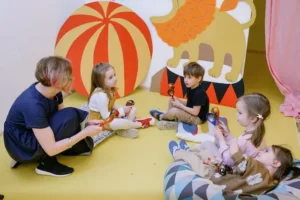Choosing the Right Preschool: Factors to Consider for Parents
Choosing the right preschool for your child is a critical decision that sets the stage for their early education and development. As a parent, you want to ensure that your child receives the best possible foundation for learning and growth. While some parents may consider home tutors as an alternative, attending a preschool offers unique benefits that contribute to a child’s social, emotional, and cognitive development. In this comprehensive guide, we will explore the essential factors parents should consider when choosing the right preschool for their child, taking into account the option of home tutors.
Choosing a Preschool: Factors to Consider

Choosing the right preschool for your child is a significant decision that can have a long-lasting impact on their development and early learning experiences. To ensure that you make an informed and thoughtful choice, consider the following factors when selecting a preschool.
1. Curriculum and Philosophy
Begin your search by understanding the preschool’s curriculum and educational philosophy. Different preschools may follow various approaches, such as Montessori, play-based, Waldorf, Reggio Emilia, or traditional academic models. Each approach has its unique strengths, and it’s essential to find one that aligns with your child’s learning style and your educational values.
- Montessori: Montessori preschools emphasize self-directed learning and hands-on activities, promoting independence and individuality. Children have the freedom to choose activities that interest them, fostering a love for learning at an early age.
- Play-based: Play-based preschools focus on learning through play, which is critical for young children’s cognitive, social, and emotional development. Play is the natural way children explore, make sense of the world, and build essential skills.
- Waldorf: Waldorf preschools prioritize imaginative play and artistic activities, fostering creativity and holistic growth. They often use natural materials and a daily rhythm to create a calm and nurturing environment.
- Reggio Emilia: Reggio Emilia preschools encourage exploration and project-based learning, with an emphasis on community involvement. Children’s interests are at the center of the curriculum, and teachers act as facilitators, guiding their discoveries.
- Traditional Academic: Traditional academic preschools concentrate on structured learning with teacher-led activities and assessments. They often introduce early literacy and numeracy skills to prepare children for formal education.
2. Teacher Qualifications and Experience
The qualifications and experience of the teachers play a significant role in your child’s preschool experience. Look for preschools that employ teachers with early childhood education degrees or certifications. Experienced teachers who understand child development and can create a nurturing, stimulating environment are essential for your child’s growth.
Ask about the teacher’s experience and tenure at the preschool. Long-term teachers indicate a stable and supportive environment, which can positively impact your child’s experience.
3. Safety and Cleanliness
Ensure that the preschool maintains a safe and clean environment. Check for safety measures such as secure entrances, childproof facilities, and first-aid readiness. Regular sanitization practices are crucial to prevent the spread of illnesses and ensure a healthy learning atmosphere.
Observe how the staff manages safety and hygiene within the classroom and on the playground. They should be attentive to potential hazards and ensure children’s well-being at all times.
4. Teacher-Child Ratio
A low teacher-child ratio is essential for individual attention and quality interaction. Smaller class sizes allow teachers to focus on each child’s needs, fostering better learning experiences and emotional support.
Ideally, for preschool-aged children, the teacher-child ratio should not exceed 1:10. This ensures that each child receives adequate attention and guidance from the teachers.
5. Location and Accessibility
You should consider the preschool’s location and accessibility from your home or workplace. Long commutes can stress your child’s day and disrupt daily routines. Additionally, evaluate the safety of the neighbourhood and the convenience of drop-off and pick-up procedures to ensure a smooth transition for your child.
6. Facilities and Resources
Visit the preschool to evaluate its facilities and available resources. A well-equipped preschool with age-appropriate toys, books, and learning materials can significantly impact your child’s engagement and development. Check for the presence of outdoor play areas, art supplies, books, and educational tools. Outdoor spaces are especially crucial, as they allow children to explore, play, and develop gross motor skills.
7. Social and Emotional Development
Look for preschools that prioritize social and emotional development. A nurturing environment that helps children build positive relationships, communicate effectively, and manage their emotions is crucial for their overall growth. Inquire about how conflict resolution is handled and how the school supports children in developing empathy and self-regulation skills. A strong focus on emotional intelligence sets the stage for healthy relationships in the future.
8. Parental Involvement
Consider the level of parental involvement encouraged by the preschool. A preschool that values and encourages parental participation fosters a strong home-school partnership, which can enhance your child’s learning experience.
Ask about opportunities for parent-teacher conferences, parent-volunteer programs, and family events. Regular communication with teachers and involvement in school activities allow parents to stay informed and engaged in their child’s preschool journey.
9. Reputation and Reviews
Researching the preschool’s reputation and reading reviews from other parents can provide valuable insights into its quality. Positive feedback and testimonials from current or former parents indicate a well-regarded preschool. For Expert home tutors, seeking references and recommendations can also help gauge their credibility and effectiveness.
10. Visiting the Preschool
Plan a visit to the preschool before making a decision. Observe the interactions between teachers and children, check the classroom setup, and assess the overall atmosphere. Ask questions to understand the preschool’s approach and how they handle specific situations. During your visit, pay attention to the engagement levels of the children and the warmth of the interactions between teachers and students. A positive and inviting atmosphere is a good indicator of a nurturing learning environment.
11. Cost and Financial Considerations
Understand the cost structure of the preschool, including tuition fees, additional expenses, and potential financial aid or scholarships. Ensure that the preschool’s fees fit within your budget. While cost is an important factor, consider the value the preschool offers to your child’s development. Sometimes, investing in a quality preschool can lead to long-term benefits for your child’s education and personal growth.
12. Accreditation and Licensing
Check if the preschool is accredited by relevant educational bodies or has the necessary licenses. Accreditation often indicates adherence to specific quality standards. Licensing ensures that the preschool meets basic safety and educational requirements set by the local authorities. It’s essential to choose a licensed preschool to ensure your child’s well-being and quality of education.
13. Transition to Kindergarten
Inquire about the preschool’s approach to preparing children for kindergarten. A well-structured transition program can ease the shift to formal schooling. Ask how the preschool supports children in developing the skills needed for kindergarten readiness, such as early literacy, numeracy, and social skills. A smooth transition can contribute to your child’s confidence and success in later academic years.
14. Inclusivity and Diversity
Consider whether the preschool promotes inclusivity and embraces diversity. A culturally diverse environment can provide enriching experiences for children.
Ask about the preschool’s efforts to incorporate diverse perspectives, cultures, and backgrounds into their curriculum and activities. A diverse environment fosters empathy and prepares children for a globalized world.
15. Gut Feeling
Trust your instincts as a parent. If you feel comfortable and confident about a particular preschool after considering all the factors, it may be the right choice for your child.
Conclusion
Remember that every child is unique, so what works for one child may not be the best fit for another. Take the time to consider your child’s needs, learning style, and personality, along with your family’s values and priorities. By doing so, you can find a preschool that fosters your child’s love for learning and sets them on a path of growth and success. A positive and supportive early learning experience can shape your child’s future in countless ways, so invest the time and effort to find the right preschool for your little one.









